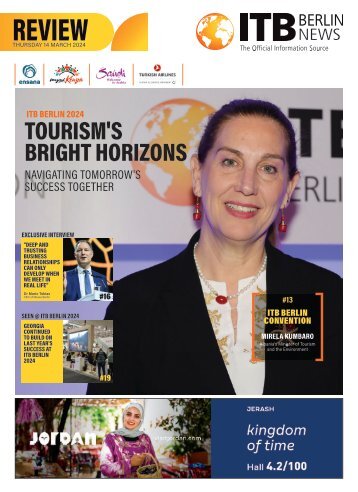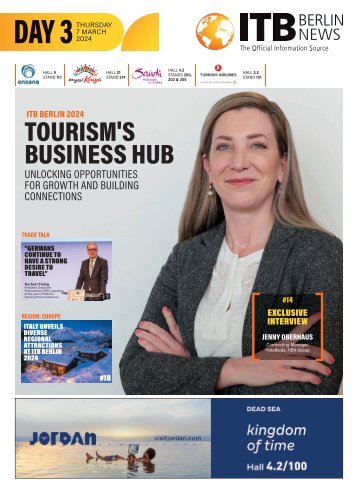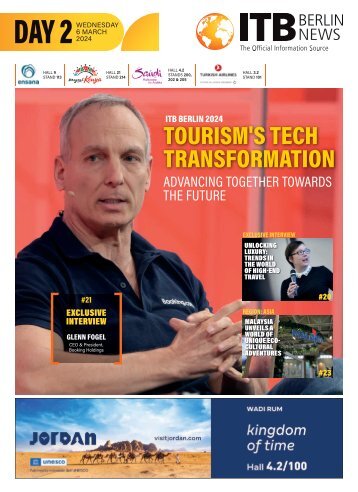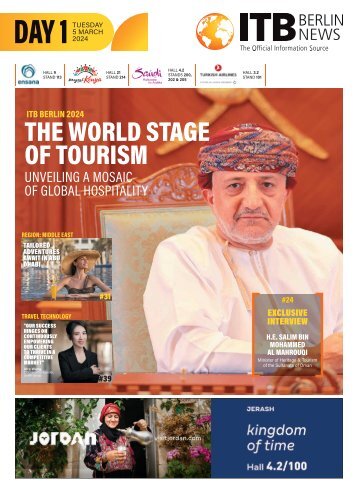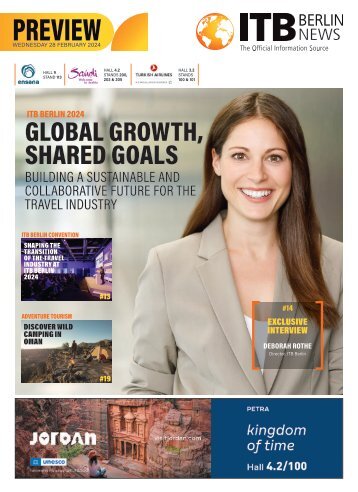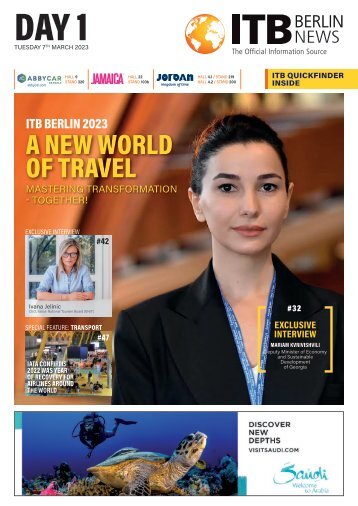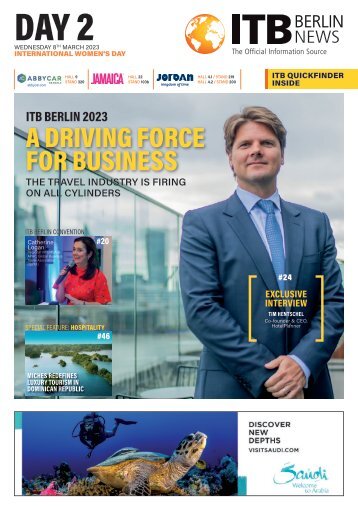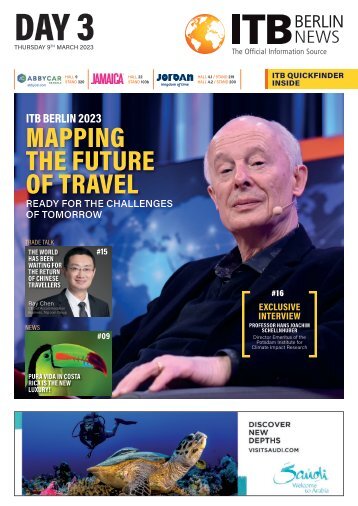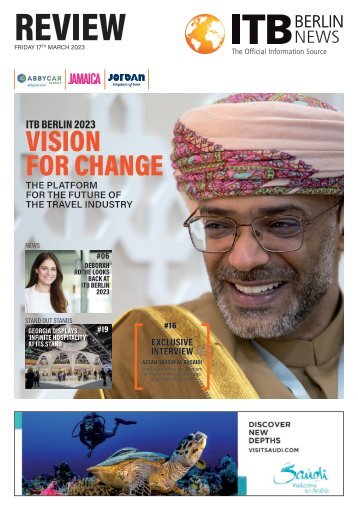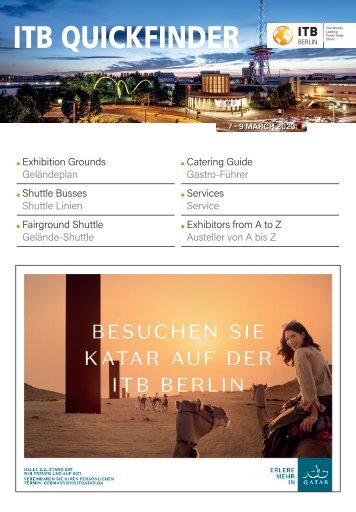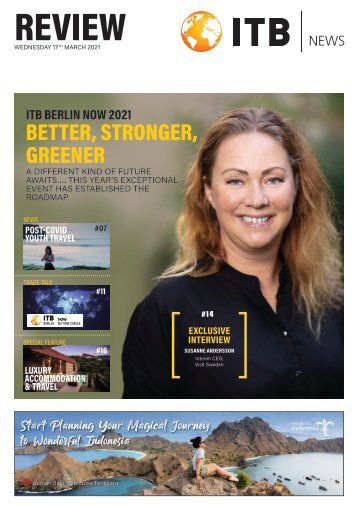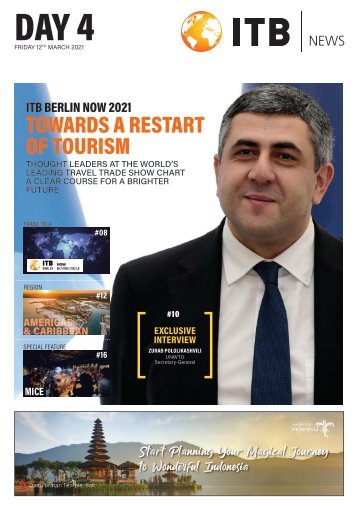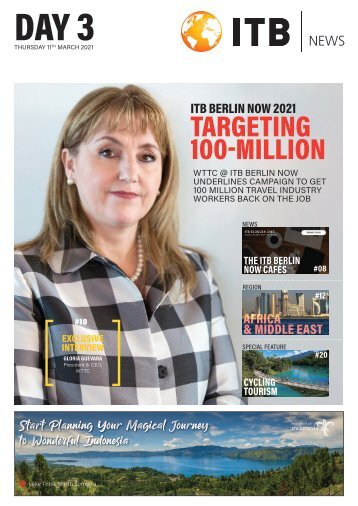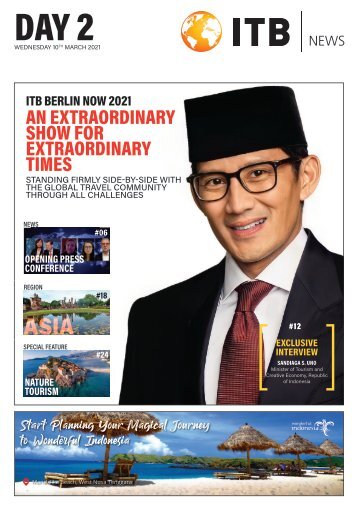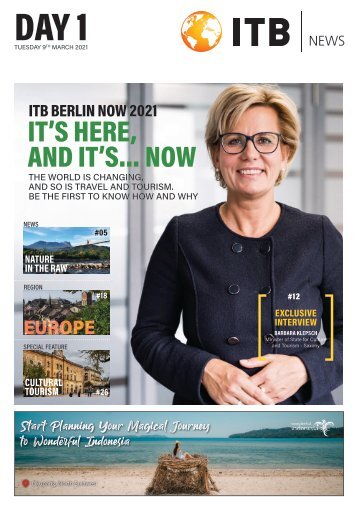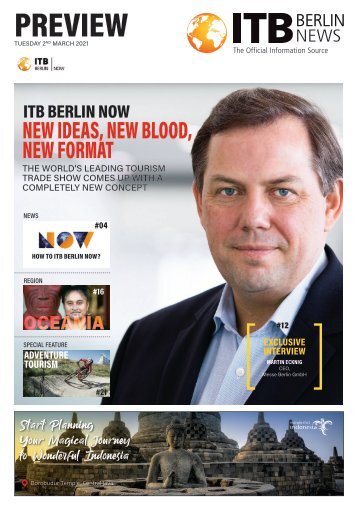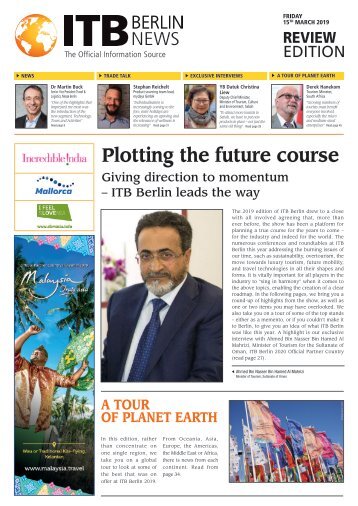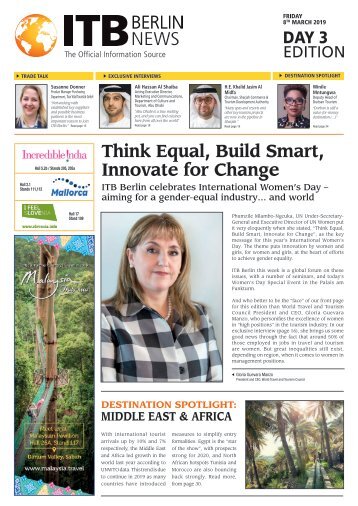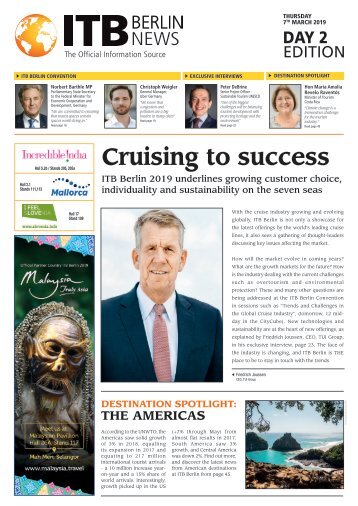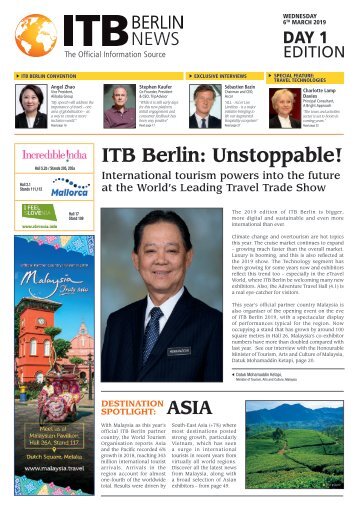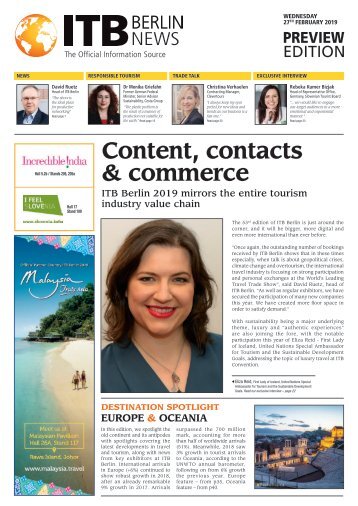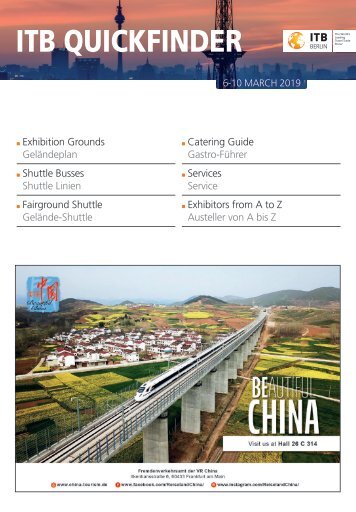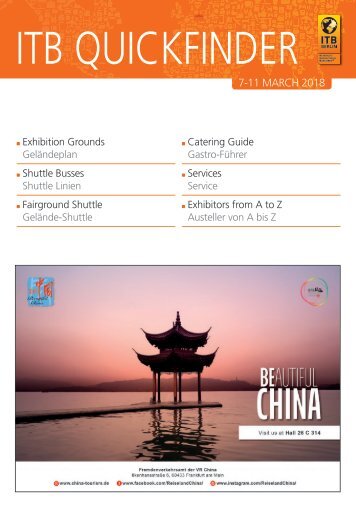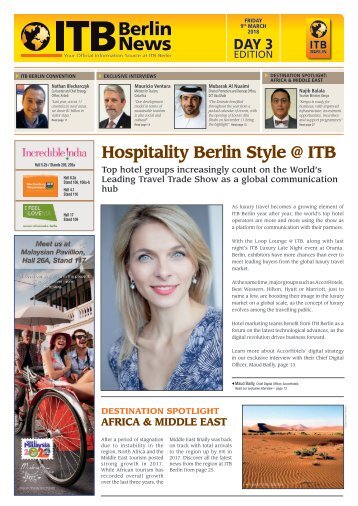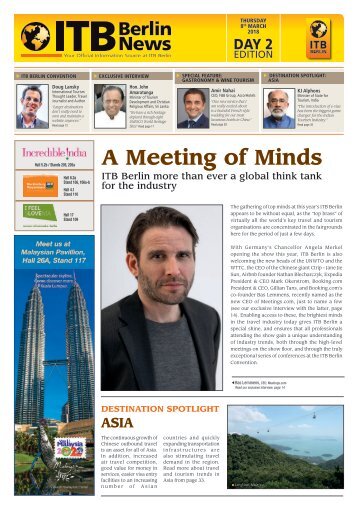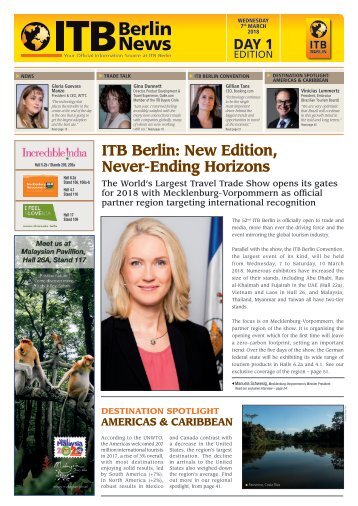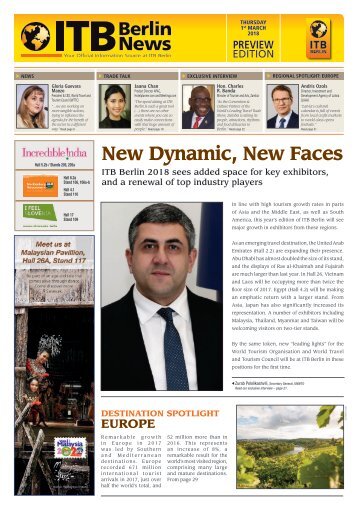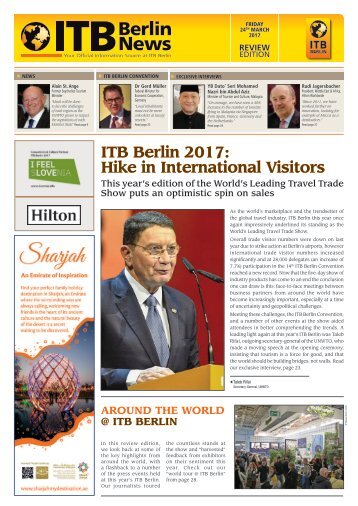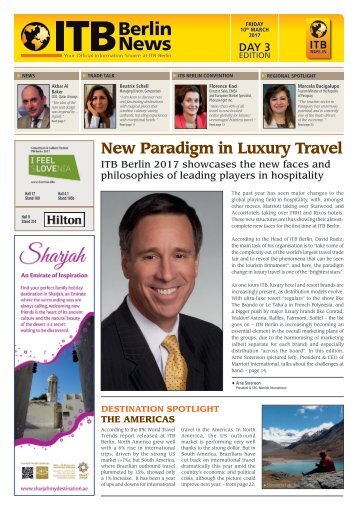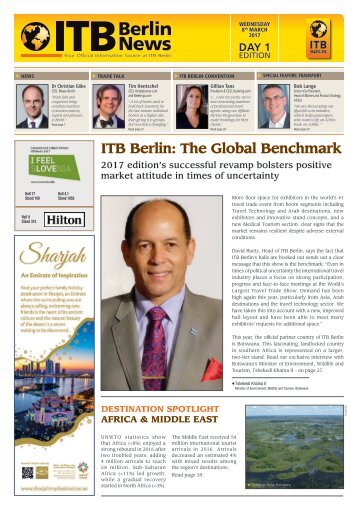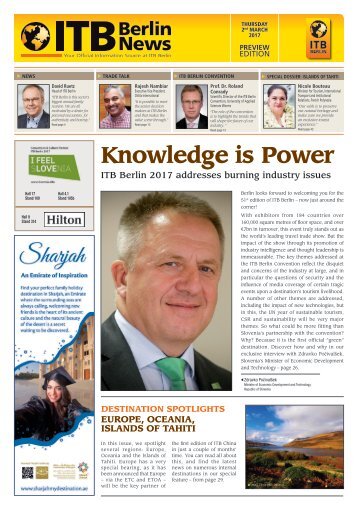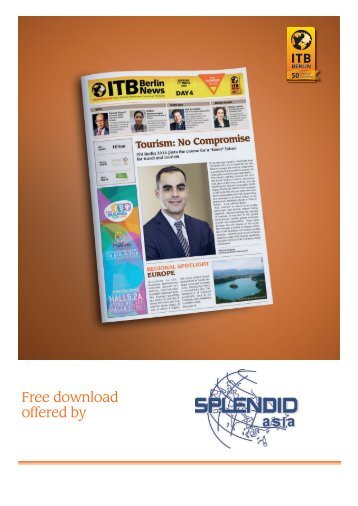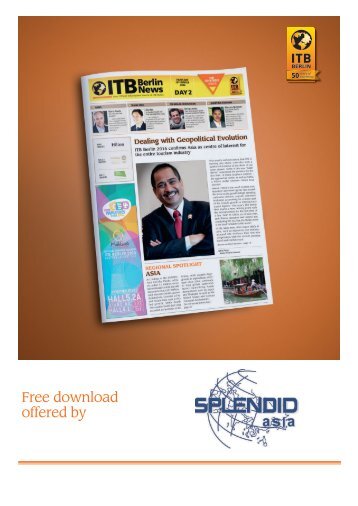
ITB Berlin News - Review Edition
- Text
- Berlin
- Tourism
- Global
- Unwto
- Sustainable
- Airlines
- Destinations
- Germany
- Travellers
- Hotels
12 NEWS Marriott: New
12 NEWS Marriott: New Roadmap Announced Impressive 2020 growth vision for Europe announced by European group president, Amy McPherson Following an historic year for the company in 2016, Marriott International has announced that it expects to dramatically increase the size of its portfolio in Europe across all segments of the industry. The planned expansion in Europe is the first development vision announced for the continent since the acquisition of Starwood Hotels & Resorts Worldwide in September 2016 that have made Marriott the world’s largest hotel company, with more than 6,000 properties in 122 countries and territories. Autograph Collection Hotels and Tribute Portfolio, and industry stalwarts, Marriott Hotels and Sheraton. The company also plans to debut Delta Hotels by Marriott in the continent, expecting to have over 4,000 opened or signed rooms for the brand in Europe by 2020. Marriott is also targeting to triple the number of signed deals for the game-changing design brand, W Hotels, in Europe by 2020, and has announced signings in Prague and Budapest already in 2017. Finally, Marriott expects the largest portion of its rooms growth will come from its affordable lifestyle brand, Moxy Hotels. With the company’s planned expansion of Moxy, Marriott expects to have the most robust affordable lifestyle portfolio in Europe by 2020. Launched in Milan in 2014, Moxy, which currently has over 1,000 rooms open in Europe and over 9,000 in its pipeline, offers travellers a stylish, spirited hotel stay at Seattle and Nashville in 2017, as well as the first signings in Asia in Bandung, Indonesia and Tokyo, Japan. Marriott International made the announcement from the International Hotel Investment Forum (IHIF) in Berlin, where President and CEO Arne Sorenson was awarded the Lifetime Achievement Award showcasing his career accomplishments including managing the hotel industry deal of the decade with the “2016 was a momentous year for both the company and our continent team. We added 40,000 rooms in Europe with the Starwood acquisition alone, and achieved our longterm goal to triple in size, from 40,000 open rooms in 2010 to 134,000 open or signed rooms at the end of 2016,” said Amy McPherson, President and Managing Director, Marriott International, Europe. “Now, as we look to the future, we have set ambitious goals for 2020. We plan to expand our lead in the luxury and full-service segments, to have the largest portfolio in the upscale tier and to win with Millennials in the affordable lifestyle category.” Marriott currently operates the largest portfolio of hotels in the luxury and full-service segments in Europe and plans on expanding this lead through accelerated growth of its iconic luxury brands, such as The Ritz-Carlton and St. Regis, its collection brands, including The Luxury Collection, Marriott says it is also aiming to lead in the European upscale segment by 2020. Marriott currently has the fifth largest portfolio of open hotels in that segment today with nearly 24,000 open rooms featuring brands including AC Hotels, Aloft Hotels and Four Points by Sheraton. The company is targeting to double this portfolio in the continent in opened and signed rooms by 2020 and, in doing so lead the segment. Marriott has set a goal of expanding its Courtyard Hotels presence in Europe by over 12,000 opened and signed rooms by 2020, backed by a strong pipeline of expected openings including Paris, Dresden and Edinburgh in 2017. Expansion in the extended stay segment should come from adding over 30 open and signed hotels to the innovative Residence Inn and Element brands, which today have signed deals in cities including London, Aberdeen and Amsterdam. The Westin Hamburg an affordable price. Looking to compete with other affordable, experience-driven brands, Marriott expects to add an additional 22,000 signed rooms for Moxy by 2020 of which 18,000 rooms are expected open in the next three years. In 2017, Moxy Hotels are expected to open in key European cities including London, Amsterdam, Frankfurt, Vienna and Oslo. The brand will also continue its expansion in the United States with openings in New York, acquisition of Starwood in 2016. “I am honoured and deeply humbled to be recognized with this distinction,” said Sorenson. “For me this recognition is a reflection of the dedication and loyalty of the more than 675,000 associates in our managed and franchised properties around the world who make Marriott International what it is.” © Michael Zapf. ITB BERLIN NEWS • Friday 24 th March 2017 www.itb-berlin-news.com
NEWS 13 Germany Baltic Sea in Heiligendamm Millennial Workplace Trends Revealed Marti Grimminck’s insight into the evolution of the tourism industry with a new generation waiting to take over GERMANY RETAINS POPULARITY AMONG EUROPEAN TRAVELLERS Germany remains of the top destinations in Europe for travellers, although 2016 marked a slowdown in growth. But the DZT remains optimistic for 2017 and expects even stronger growth in both arrivals and overnights. With a total of 447.3 million overnights, including 80.8 million from foreign travellers, Germany again experienced a record year, the seventh in succession. For the first time, foreign overnights passed the symbolic mark of 80 million, a 1.4% increase over the previous year. “We must continue to communicate and market an attractive image of Germany as a destination”, highlighted Klaus Laepple, President of the Board of Directors of the German National Tourism Board DZT. “Germany retains its strong position in Europe, being the second most popular travel destination for Europeans with 53.7 million trips”, explained Petra Hedorfer, CEO of the DZT. Europe represented in 2016 over 73.7% of all overnights. When looking at city breaks, Germany is indeed number one in Europe with 12.1 million trips. The three top inbound markets remained in 2016 the Netherlands, Switzerland and the UK. “We however continue to predict growth from emerging overseas destinations”, indicated Mrs. Hedorfer. Asia and Latin America are definitely our future growth markets. “Although we saw a slight decrease from overseas markets last year, due from a drop in overnights from Japan, the Gulf, Brazil and South Africa, we still predict a growth between 10% and 15% for Latin America and Asia”, she said. For 2017, the DZT is launching a new communication campaign #GermanySimplyInspiring across online and social media channels with travel packages. In 2018, the DZT plans to communicate about Germany as a land of culinary, a popular theme all across the globe Marti Grimminck, CEO & Founder, International Connector attended ITB Berlin notably as a panellist for the presentation on Student Travel, part of the seventh consecutive Youth Travel Summit which saw governments, associations, destinations, providers and nonindustry experts discussing the broader economic, political and societal impact of this 0bn industry. While onsite, she revealed the findings of her company International Connector’s research into the impact of Millennial employees on tourism companies: “For years marketing headlines have been aimed at Millennials in an effort to attract fast- paced digital natives. Companies have fully embraced the connected traveller who uses new technologies, including sharingeconomy apps. However, this focus on the consumer is not enough; not only has the consumer evolved, but the workforce has as well. To remain market leaders attracting top talent, companies need a new approach to both their business and their employees. Today Millennials are taking on more management roles and changing workplace expectations. Companies are now citing unprecedented levels of turnover in younger employees as social and digital interactions drive youth to seek new workplace settings. Technological and communication habits are sparking intergenerational frustrations. In the last year, our company, International Connector, interviewed 18- 30 year olds (aka Millennials and Generation Z) worldwide to determine trends disrupting the workplace. Through an interactive, virtual process, we put the design into the hands of young employees to create their vision of the future of work. We discovered similar desired outcomes of youth in over 50 countries: Millennials seek a transparent relationship with superiors. Most questioned the “superior” concept and offered suggestions of how to empower employees on all levels. Moreover, many work policies seem archaic to youth, such as requiring set hours in the office. They argue that youth are always connected on their devices so that physical space is a limiting concept. There is also discontent with communication policies. Outside the office, Millennials tend to communicate on social apps like Snapchat and Instagram. However, in the office, they are expected to forgo their normal communication tools. New perspectives like these are daunting for directors who came of age in a very different workplace. However, the future talent of the tourism industry will continue to evolve whether they embrace the changes or not.” Marti Grimminck CEO & Founder, International Connector ITB BERLIN NEWS • Friday 24 th March 2017
- Page 1: FRIDAY 24 TH MARCH 2017 REVIEW EDIT
- Page 4 and 5: 4 NEWS © Messe Berlin GmbH ITB Ber
- Page 6 and 7: 6 NEWS The Year That Was - And The
- Page 8 and 9: 8 NEWS 6 th UNWTO Silk Road Tour Op
- Page 10 and 11: 10 NEWS (L-R): Neil Glenn, General
- Page 15 and 16: NEWS 15 Best Medical Tourism Destin
- Page 17: NEWS 17 Tom Alderink Director LGBT
- Page 20 and 21: 20 TRADE TALK Better People, Better
- Page 22 and 23: 22 ITB BERLIN CONVENTION Minister M
- Page 24 and 25: 24 EXCLUSIVE INTERVIEW YB Dato’ S
- Page 26 and 27: 26 EXCLUSIVE INTERVIEW 5 Pillars to
- Page 28 and 29: 28 AROUND THE WORLD @ ITB BERLIN Sl
- Page 30 and 31: 30 AROUND THE WORLD @ ITB BERLIN Ky
- Page 32 and 33: 32 AROUND THE WORLD @ ITB BERLIN In
- Page 34 and 35: 34 SPOTLIGHT ON GERMAN REGIONS Metz
- Page 36: 36 WHERE TO GO IN Berlin Cultural E
Inappropriate
Loading...
Mail this publication
Loading...
Embed
Loading...
